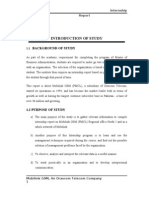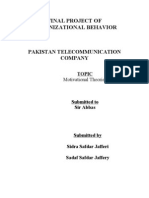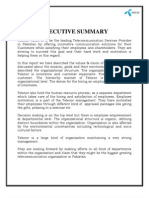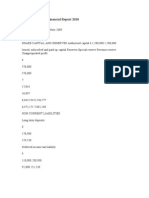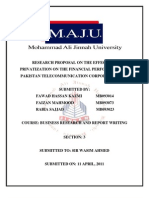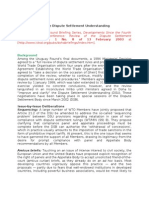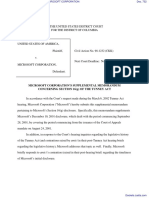IE2001
IE2001
Uploaded by
eyaacobCopyright:
Available Formats
IE2001
IE2001
Uploaded by
eyaacobCopyright
Available Formats
Share this document
Did you find this document useful?
Is this content inappropriate?
Copyright:
Available Formats
IE2001
IE2001
Uploaded by
eyaacobCopyright:
Available Formats
Tursina Yaacob 0800974
Short Essay
Tursina Yaacob 0800974
This project paper is a partial fulfilment of Module IE2001 of Part II of Chartered Islamic Finance Professional (CIFP) INCEIF
September 2010
IE2001 Assignment
Page 1 of 8
Tursina Yaacob 0800974
1) Describe the role of ethics in business from the Islamic perspective. Based on this perspective indicate how and when Islamic ethics can contribute to corporate governance of profit and non-profit organisations.
Ethics in the corporate landscape can be defined as the critical and structured assessment of how people and companies should behave in the business world. It involves examining appropriate constraints on the pursuit of self-interest, or to a company, in pursuit of profits, when the actions of individuals or firms can affect others. Therefore, ethical behaviour aims to improve and maintain the integrity of a system which covers the areas of corporate governance, management, etc. as it sets limits on individual and corporate behaviour to achieve long-term goals of well-being and development. Ethics aims to maintain the integrity of the system of corporate governance, which in turn maintains organizational integrity. Among values that will drive corporate governance are responsibility, accountability, check and balance, fairness, independence, transparency and personal and corporate integrity. These values will lead to the development and sustenance of trust within the organisation.
According to Iqbal and Lewis (2009), the closest concept to governance is through an Arabic word al-hakimiya, which it refers from Bahlul (2000)1 goes beyond the procedural view of governance to identify the blueprint of a higher moral social order to which all decision making structures or authority ought to submit, if they believe that peace in its outer and inner manifestations could be achieved only by surrendering ones will to the Will of God
Corporate governance refers to the method by which a corporation is directed, administered or controlled. It includes the laws and customs affecting that direction, as well as the goals for which it
1
Bahlul, Raja (2000), People vs. God: the logic of divine sovereignity, in Islamic democratic discourse, Islam and Christians Muslim Relations, 11(3), 287-97 Page 2 of 8
IE2001 Assignment
Tursina Yaacob 0800974
is governed. Corporate governance mechanisms and controls are designed to reduce the inefficiencies that arise from moral hazard and adverse selection. Corporate governance is also viewed as a process of monitoring performance by applying appropriate counter-measures and dealing with concepts such as transparency, integrity and accountability.
Within the Islamic context, ethics, be it in business or personal level, is an expected element in a Muslim. Ahmad (2004)2 reminded that man requires property in order to fulfil his function as the khalfah, Gods vicegerent on earth, as said in the Quran. Behold thy Lord said to the angels: I will create a vicegerent on earth. They said, Wilt thou place therein one who will make mischief therein and shed blood? Whilst we do celebrate Thy praises and glorify Thy holy (name)? He said: I know what ye know not (Quran 2:30, trans. Ali).
Therefore, it is essential that Muslims, as a khalifah, adheres to Gods [perintah], which includes conducting his life in an ethical manner. As God is perfect and omniscient, Muslims have a code that is neither timebound nor biased by human whims. The Islamic code of ethics is enforceable at all times because God is closer to man than his jugular vein, and has perfect, eternal knowledge. With this as basic guidance to life, the Shariah law provides a holistic and complete way of undertaking all aspects of business dealings from speaking to a customer, writing a contract to awarding tenders/ projects. Among the concepts or doings that should be undertaken according to Shariah requirements and its impact on corporate governance are as follows: Code of Ethics. The setting up of a code of ethics within an organisation is in line with good corporate governance practice. Such codes should enhance ethical behaviour among organizational employees and management. Personal values. An individuals values and morals will also influence his or her ethical
Ahmad, Imad-ad-Dean. Islam, Commerce, and Business Ethics. Plenary address at the Loyola Institute for Ethics and Spirituality in Business International Ecumenical Conference. 10-12 June 2004. IE2001 Assignment Page 3 of 8
2
Tursina Yaacob 0800974
standards. A person who stresses honesty will behave very differently from another who does not respect other peoples property.
In commerce, an organisations aim is to maximise profit. This is allowed within the Shariah context, depending on some criterias such as: 1) operations must not be business not permissible by Shariah standards; 2) no element of gharar and discrimination in all business dealings/ transactions; and 3) transparent operations (e.g. guidelines and expectations are clearly defined and profit/risk sharing arrangements are pre-determined). Here, not only Shariah views are required (e.g. banks need to have a Shariah Advisory Committee to ensure products and transactions adheres to the requirement of Shariah) but the people running the business are also required to conduct the transaction in a responsible, fair, just and transparent manner. The impact of this is obvious in the real world where it will win customers trust and contribute to repeat business thus enhancing profits and zakat contribution. In hereafter, the rewards from God would be greater.
In summary, the teaching of Islam and corporate governance practices goes hand-in-hand and cannot be separated. People that adhere to Shariah obligations of doing business will automatically conduct himself in an ethical way, which will translate into his dealings in commerce, communications in the society as well as within his family.
IE2001 Assignment
Page 4 of 8
Tursina Yaacob 0800974
2) Discuss the recent guidelines on governance of financial institutions formulated by International Islamic Financial and Accounting Standard organizations. Explain why despite these standards, some Muslim countries are still adopting their own standards. Use the country example familiar to you.
Good corporate governance is considered vital as it promotes morality, honesty, integrity, trust, openness, performance orientation, responsibility and accountability, as well as mutual respect and commitment to the organisation from all parties in an organisation. Corporate governance does not only does apply to directors and executives, but to all players in the organisation.
To this end, the Accounting and Auditing Organization for Islamic Financial Institutions (AAOIFI) and the Islamic Financial Service Board (IFSB) have outlined a set of guideline on governance. A common trait is that all banks have to take account of risks and within it, the role and importance of good corporate governance and risk management are highlighted.
In December 2006, the IFSB released a set of guiding principles on corporate governance for institutions offering only Islamic financial services. The document has four guiding principles, as follows: 1. General governance approach of Islamic financial services institutes 2. Rights of Investment Account Holders (IAH) 3. Compliance with Shariah rules and principles 4. Transparency of financial reporting in respect of investment accounts
In ensuring a general governance approach, the IFSB proposed an establishment of a comprehensive governance policy framework which will cultivate a good governance culture with specific strategic roles and functions of each organ of governance. In addition, the IFSB also
IE2001 Assignment
Page 5 of 8
Tursina Yaacob 0800974
recommends that Islamic financial institutions abide by globally recognized reporting standards. This should include the setting up of an Audit Committee and its management and supervisory role. In dealing with IAHs, Islamic financial institutions should ensure that the investment accounts are managed within the mandated parameters. IAHs should be adequately advised of their contractual rights and risks with regard to investment account products, including primary investment and asset allocation strategies and the method of calculating the profit/loss made from their investments. The investment strategy should be aligned to the risk and return expectations of IAH and be transparent in smoothing any returns. Furthermore, it is also important to make adequate and timely disclosure to IAHs and the public of material and relevant information on the investment accounts managed. Compliance with Shariah requirement is a given task in Islamic financial institutions. What is key is an appropriate system for obtaining rulings from Shariah scholars, applying fatwa and the monitoring Shariah compliance in aspects of products, operations and activities.
While these are the industry standards as proposed by the IFSB, some countries and jurisdictions have their own governance standards. The rationale for this is to be aligned with their own set of regulations as outlined by the relevant authorities. In Malaysia for instance, Bank Negara Malaysia (BNM) as the central bank as the banking sector regulator has introduced in October 2005, its own Guidelines on Corporate Governance for Licensed Islamic Banks. It was introduced as a general guideline following the introduction of these guides, which was established earlier, as depicted in the table below. Guidelines Date Introduced Guidelines on the Governance of Shariah Committee for the Islamic 15 December 2004 Financial Institutions Guidelines on Financial Reporting for Islamic Banks 24 June 2005 Guidelines on Minimum Audit Standards for Internal Auditors 27 January 1997 Source: Guidelines on Corporate Governance for Licensed Islamic Banks, BNM
IE2001 Assignment
Page 6 of 8
Tursina Yaacob 0800974
BNM has also introduced a Concept Paper on Shariah Governance Framework for Islamic Financial Institutions, aimed to provide a comprehensive guidance to the board, Shariah committee and management of the IFI in discharging its duties in matters relating to Shariah.
Nevertheless, BNMs Guidelines on Corporate Governance for Licensed Islamic Banks are aligned to several governance guidelines including the IFSB Guiding Principles on Corporate Governance for Institutions Offering Only Islamic Financial Services (Excluding Islamic Insurance (Takaful) Institutions and Islamic Mutual Funds)3. Similar to IFSB, BNMs governance guidelines were formulated based on the fundamental concepts of responsibility, accountability and transparency, with greater emphasis on the role of the board and management. The guidelines also contain broad principles dealing with 1) board matters; 2) management oversight; 3) accountability and audit; and 4) transparency. These principles are similar to that outlined by IFSB.
Therefore, while certain countries have their own governance standards, it is still based on the same principles and values that have been proposed by IFSB and other international authority. It should be viewed positively by industry observers as these additional guidelines are tailored to the domestic industry. At the end of the day, it serves the same purpose of promoting governance with the aim to further grow the Islamic banking and finance industry. In times of promoting transparency, these additional guidelines offer a positive perception towards the Islamic banking and finance industry as it shows that this is a proper and structured industry, especially when comparison is made with conventional banking and finance. It will help in attracting new stakeholders4 into the industry and further promote Islamic banking and finance.
3 4
Clause 1.05 of Guidelines on Corporate Governance for Licensed Islamic Banks, BNM, 1 October 2005 Stakeholders may include investors and other conventional and Shariah-compliant financial institutions including banks, asset management companies, takaful and private equities entities. Page 7 of 8
IE2001 Assignment
Tursina Yaacob 0800974
References
Iqbal, Zafar & Lewis, Mervyn. An Islamic Perspective on Corporate Governance. Elgar Publishing, 2009 Ahmad, Imad-ad-Dean. Islam, Commerce, and Business Ethics. Plenary address at the Loyola Institute for Ethics and Spirituality in Business International Ecumenical Conference. 10-12 June 2004. Islamic Financial Services Board. Guiding Principles on Corporate Governance for Institutions Offering Only Islamic Financial Services (Excluding Islamic Insurance (Takaful) Institutions and Islamic Mutual Funds). December 2006. Bank Negara Malaysia. Guidelines on Corporate Governance for Licensed Islamic (Revised). January 2007. Bank Negara Malaysia. Concept Paper on Shariah Governance Framework for Islamic Financial Institutions.
IE2001 Assignment
Page 8 of 8
You might also like
- PTCL Report of 8Document46 pagesPTCL Report of 8HAFIZ ABDUL HAYE BAKHTIARNo ratings yet
- Pakistan Telecommunication LTD.-PTCLDocument37 pagesPakistan Telecommunication LTD.-PTCLaeehaNo ratings yet
- Marketing Project MobilinkDocument43 pagesMarketing Project MobilinkAamir Raza50% (2)
- Law Notes AIBEDocument40 pagesLaw Notes AIBENaveed SaifNo ratings yet
- Swot Analysis of PTCLDocument5 pagesSwot Analysis of PTCLM Aqeel Akhtar JajjaNo ratings yet
- PTCL HaseebDocument160 pagesPTCL Haseebzaidmunir19890% (1)
- PTCL Company Report Final by Tauqeer 2Document50 pagesPTCL Company Report Final by Tauqeer 2M.TauqeerNo ratings yet
- Suleman RasheedDocument29 pagesSuleman Rasheedahmed nasirNo ratings yet
- 403 Final Internship Report On PTCLDocument68 pages403 Final Internship Report On PTCLKhurshed AhmadNo ratings yet
- 6 PTCL Privatisation PaperDocument22 pages6 PTCL Privatisation PaperSyeda AliyaNo ratings yet
- PTCL Internship ReportDocument14 pagesPTCL Internship ReportSaleem KhanNo ratings yet
- PTCL Positioning StatementDocument5 pagesPTCL Positioning StatementZohaib AhmerNo ratings yet
- PTCL's Privatization: The Biggest Financial Scam in Pakistan's History?Document4 pagesPTCL's Privatization: The Biggest Financial Scam in Pakistan's History?ash haq100% (1)
- A Project Report On PSMCDocument8 pagesA Project Report On PSMCWazeeer AhmadNo ratings yet
- Advertising and Brand Management of PTCL BroadbandDocument40 pagesAdvertising and Brand Management of PTCL BroadbandDanish HussainNo ratings yet
- HRM Report of PTCLDocument33 pagesHRM Report of PTCLMohammad Nasir25% (4)
- Telenor ReportDocument28 pagesTelenor Reportazeem bhatti100% (1)
- HR Practices at MobilinkDocument39 pagesHR Practices at MobilinkAdnan Akram100% (1)
- Report On PTCLDocument82 pagesReport On PTCLYasir Masood100% (1)
- Internship Report Mobilink FinalDocument61 pagesInternship Report Mobilink FinalMuneeb Sohail100% (2)
- Internship at Marketing Department of PTCLDocument4 pagesInternship at Marketing Department of PTCLLightTheFire100% (1)
- Telenor PVT LTD Pakistan Internship ReportDocument63 pagesTelenor PVT LTD Pakistan Internship ReportMoni Shah100% (1)
- Internship Report - PELDocument15 pagesInternship Report - PELsalman884No ratings yet
- Ob PTCL Final ReportDocument20 pagesOb PTCL Final Reportsadafjafri80% (5)
- Telenor Company BackgroundDocument8 pagesTelenor Company BackgroundZohaib Ahmed JamilNo ratings yet
- Block 1Document54 pagesBlock 1Zaki IrshadNo ratings yet
- Organizational Culture of Telenor PakistanDocument4 pagesOrganizational Culture of Telenor PakistanBadar Munir100% (1)
- PTCL Report POMLDocument21 pagesPTCL Report POMLKhadija IqbalNo ratings yet
- PTCL Audit ReportDocument17 pagesPTCL Audit ReportSana PervezNo ratings yet
- Pest Analysis of TelenorDocument4 pagesPest Analysis of TelenorMuhammad Sohaib100% (1)
- Intership Report MBA HRM (2003)Document95 pagesIntership Report MBA HRM (2003)Fee ZeeNo ratings yet
- Financial Statements Analysis of Attock Petroleum Company LimitedDocument36 pagesFinancial Statements Analysis of Attock Petroleum Company LimitedHumayun82% (11)
- ARTIKEL 2 - 13 Fluidity in Project Management Teams Across ProjectsDocument13 pagesARTIKEL 2 - 13 Fluidity in Project Management Teams Across ProjectsNorman SuliNo ratings yet
- HRM ReportDocument23 pagesHRM ReportemanNo ratings yet
- Job Satisfaction Factors of PTCL EmployeesDocument9 pagesJob Satisfaction Factors of PTCL EmployeesAwais IqbalNo ratings yet
- Suzuki Annual Report 2011Document93 pagesSuzuki Annual Report 2011mirzamohsin000No ratings yet
- Telenor PakistanDocument23 pagesTelenor PakistanUzair ShahNo ratings yet
- Report On MCB BANKDocument71 pagesReport On MCB BANKQuwat Khan KhanNo ratings yet
- Chap 3 HR Department of PTCL HeadquarterDocument19 pagesChap 3 HR Department of PTCL Headquarterstoned090% (1)
- Marketing Strategy: UfoneDocument4 pagesMarketing Strategy: UfoneHamza ChaudhryNo ratings yet
- Zong PresentationDocument32 pagesZong PresentationShahrukhNo ratings yet
- Financial Statement Analysis of Lucky CementDocument27 pagesFinancial Statement Analysis of Lucky CementRaja UmairNo ratings yet
- Report On: Advertising & Brand Management DR. M.A.K ChistyDocument10 pagesReport On: Advertising & Brand Management DR. M.A.K ChistyImran KhanNo ratings yet
- PTCL Internship Report 2020Document16 pagesPTCL Internship Report 2020Abdul WaheedNo ratings yet
- Downfall OF MobilinkDocument26 pagesDownfall OF Mobilinkfizza.azam100% (1)
- Strategic Management - Ufone ProjectDocument16 pagesStrategic Management - Ufone Projectlushcheese97% (29)
- Report On Information System of Muslim Commercial BankDocument20 pagesReport On Information System of Muslim Commercial Bankannieriaz63% (8)
- Principal of MKTG (PTCL)Document42 pagesPrincipal of MKTG (PTCL)fathathassnain100% (1)
- Organizational Structure of PTCLDocument4 pagesOrganizational Structure of PTCLUmer AbidNo ratings yet
- New Jubilee Internship ReportDocument92 pagesNew Jubilee Internship ReportYasir Ayaz100% (11)
- Attock Petroleum Financial Report 2010Document6 pagesAttock Petroleum Financial Report 2010Naveed JavedNo ratings yet
- Assignment Financial Management RVSDDocument10 pagesAssignment Financial Management RVSDY.Nirmala YellamalaiNo ratings yet
- HRM CaseDocument20 pagesHRM CasePriyam ChakrabortyNo ratings yet
- PTCL ReportDocument27 pagesPTCL ReportUmer KhanNo ratings yet
- Research Proposal On PTCLDocument9 pagesResearch Proposal On PTCLSajid AlyasNo ratings yet
- The Future of Work: Adapting to the Rise of Automation and AIFrom EverandThe Future of Work: Adapting to the Rise of Automation and AINo ratings yet
- The Effects of Taxation on Multinational CorporationsFrom EverandThe Effects of Taxation on Multinational CorporationsRating: 5 out of 5 stars5/5 (1)
- CG in Islamic FinanceDocument4 pagesCG in Islamic FinancehanyfotouhNo ratings yet
- Understanding Thework Ethics and Corporate Governance in Bank Muamalat Malaysia Berhad.Document5 pagesUnderstanding Thework Ethics and Corporate Governance in Bank Muamalat Malaysia Berhad.inventionjournalsNo ratings yet
- Corporate Governance and Islamic FinanceDocument4 pagesCorporate Governance and Islamic Financehanyfotouh100% (2)
- US vs. Kepner (1902 and 1903)Document2 pagesUS vs. Kepner (1902 and 1903)Third VillareyNo ratings yet
- FW Marijuana Grow Pasco 2505 CommercialDocument1 pageFW Marijuana Grow Pasco 2505 Commercial420leaksNo ratings yet
- Women's Rights in TanzaniaDocument7 pagesWomen's Rights in TanzaniaNeema Nemburis Nole Ndemno100% (2)
- (Prepared by Judge ESTELA ALMA A. SINGCO) : 2016 Prebar Review Notes in Constitutional Law Article Viii (Judicial)Document30 pages(Prepared by Judge ESTELA ALMA A. SINGCO) : 2016 Prebar Review Notes in Constitutional Law Article Viii (Judicial)RmLyn MclnaoNo ratings yet
- Vishakha GuidelinesDocument6 pagesVishakha GuidelinesDeepak GNo ratings yet
- Poli Law, Set 2, FULLDocument198 pagesPoli Law, Set 2, FULLApureelRoseNo ratings yet
- Matrix - Constitutional Law Review IDocument32 pagesMatrix - Constitutional Law Review IDennie Vieve IdeaNo ratings yet
- Arbitration: TITLE: Review of The Dispute Settlement Understanding ReferenceDocument4 pagesArbitration: TITLE: Review of The Dispute Settlement Understanding ReferencezirkelNo ratings yet
- Good Clinical PracticesDocument22 pagesGood Clinical PracticesMikeZ1960100% (2)
- Supreme Court Guidelines - NDocument3 pagesSupreme Court Guidelines - NKalyan GinkaNo ratings yet
- Province of Cotabato Vs GoPDocument4 pagesProvince of Cotabato Vs GoPJomar TenezaNo ratings yet
- People Vs XXX and YYYDocument17 pagesPeople Vs XXX and YYYDaf MarianoNo ratings yet
- People vs. RegalaDocument1 pagePeople vs. RegalaMrln Vloria0% (1)
- PDF Intellectual Property Rights Assignment Session 2016 17 Analysis of Designs Act 2000Document9 pagesPDF Intellectual Property Rights Assignment Session 2016 17 Analysis of Designs Act 2000WanteiNo ratings yet
- MIL-workbook-lesson-5 - 6-Understanding-Media-Aesthetics-of-New-Media (Recovered)Document4 pagesMIL-workbook-lesson-5 - 6-Understanding-Media-Aesthetics-of-New-Media (Recovered)Michaer AmingNo ratings yet
- 522 People Vs PecardalDocument1 page522 People Vs PecardalBrent TorresNo ratings yet
- Moot PropositionDocument3 pagesMoot PropositionYeshwanth MCNo ratings yet
- California Business & Professions CodeDocument1 pageCalifornia Business & Professions CodeCalifornia Judicial Branch News Service - Investigative Reporting Source Material & Story IdeasNo ratings yet
- Boysaw V Interphil Promotions IncDocument2 pagesBoysaw V Interphil Promotions InceieipayadNo ratings yet
- Advocates Act (Respondent)Document29 pagesAdvocates Act (Respondent)Amitabh BoseNo ratings yet
- How To Make Proper Pleading in Phils.Document3 pagesHow To Make Proper Pleading in Phils.jasmin coNo ratings yet
- Ethics and Good GovernanceDocument8 pagesEthics and Good GovernanceJeremy MarinayNo ratings yet
- C.1. - Facura v. Court of Appeals, GR No 166495, 16 February 2011 PDFDocument25 pagesC.1. - Facura v. Court of Appeals, GR No 166495, 16 February 2011 PDFPamela PrietoNo ratings yet
- UNITED STATES OF AMERICA Et Al v. MICROSOFT CORPORATION - Document No. 732Document9 pagesUNITED STATES OF AMERICA Et Al v. MICROSOFT CORPORATION - Document No. 732Justia.comNo ratings yet
- G.R. No. 173946 BOSTON EQUITY RESOURCES, INC., vs. COURT OF APPEALS and LOLITA G. TOLEDODocument1 pageG.R. No. 173946 BOSTON EQUITY RESOURCES, INC., vs. COURT OF APPEALS and LOLITA G. TOLEDOCrizel Mae MansinadezNo ratings yet
- Government System of JapanDocument2 pagesGovernment System of Japanapi-339465447No ratings yet
- Tiu vs. ArriesgadoDocument22 pagesTiu vs. ArriesgadoLance Christian Zoleta100% (1)
- Mahendrabhai Patel Vs State of GujaratDocument9 pagesMahendrabhai Patel Vs State of GujaratUnimarks Legal SolutionsNo ratings yet
- Juvenile Delinquency Handouts ReducedDocument29 pagesJuvenile Delinquency Handouts ReducedcriminologyallianceNo ratings yet



















